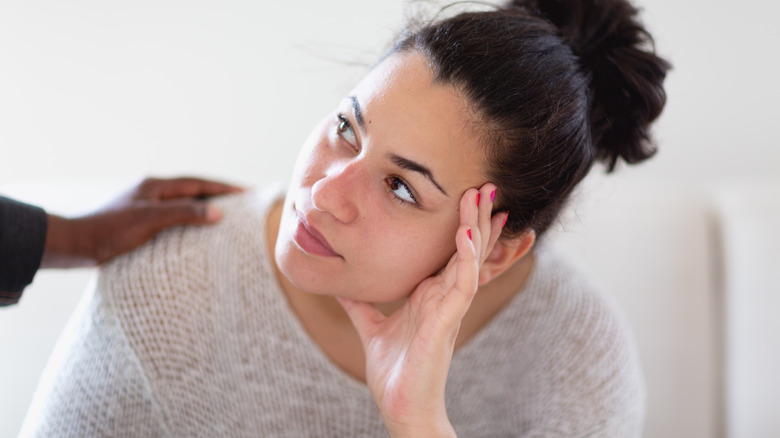Opposite Attachment Styles Happen In Friendships, Too. Here's How To Handle Them
How attentively we're loved and cared for as children and the quality of the early connections we form with our caregivers impact us deeply. In the 1950s, British psychologist Dr. John Bowlby proposed what he called attachment theory, a child's drive to bond with a parent or caregiver in order to live and thrive. He once described attachment theory as the "[L]asting psychological connectedness between human beings."
The theory states there are four basic attachment styles — secure, anxious, avoidant, and disorganized. To better navigate your life and find harmony with your friends' opposing attachment styles, you might investigate which style you most likely operate under, and then make an educated guess on the styles of your loved ones.
While there are plenty of online quizzes to take, any diagnosis should be sought from a qualified therapist or counselor for the most accuracy. Knowing your attachment style can help you understand how you handle relationships throughout life.
Understanding the four attachment styles
A secure attachment style is the healthiest, and it can be a predictor of the capacity to maintain solid, life-long relationships. It's likely your parents were loving, available, and maintained consistent responses when they cared for you. You felt seen and heard, and grew up with both a trusting nature and strong boundaries. Your self-esteem is more likely to be high, and you may feel an easy flow of communication. Furthermore, you likely have a high comfort level regardless of whether you're alone or in a relationship.
An avoidant attachment style usually results from caregivers who were unavailable and/or harsh. You may think of yourself as highly independent, and your caregivers might have urged you to take of yourself. They may not have been responsive to your childhood needs, rejecting any emotional displays. As an avoidant type, you might feel most comfortable avoiding intimacy, have trust issues, and prefer isolation over connection.
Anxious attachment style people often had parents who were inconsistent — one minute they hugged and placated you, and the next, they completely tuned out. This creates confusion about what to expect and shows up in adulthood as feeling clingy and anxious about being abandoned. It's characterized by low self-esteem, trust issues, and feeling unloveable. A disorganized attachment style is a combination of avoidant and anxious, and it can result from an abusive home. Extreme anxiety, trust issues, conflicting behaviors, and fear of rejection may sometimes tip this style into personality disorder territory.
How to handle opposing attachment styles
Part of being a good friend is letting people be who they are while accepting their flaws. Armed with a better understanding of which attachment style you are, you might respond more compassionately to your friends, partners, and workmates' styles instead of getting irritated by your differences.
Secure-style friends don't spend a lot of time worrying about friendships — they only need respectful, timely communication and good boundaries. If you've become friends with someone avoidant, communication professor Dr. Lee M. Pierce tells HelloGiggles it's best not to get upset if you don't hear back. "Try showing support in other ways, such as liking their social media posts, sending a care package, or joining them in a hobby they like, such as an online game," Dr. Pierce told the source.
Because anxious-style friends fear rejection the most, you might reassure them by showing them how much you value their friendship. "To be a supportive friend, you can let them know it's OK if they disagree with you," Dr. Yasmine Omar, assistant professor in the Menninger Department of
Psychiatry and Behavioral Sciences, told Baylor College of Medicine. With disorganized-style friends, you can modulate your response based on whether they're in avoidant or anxious mode.


